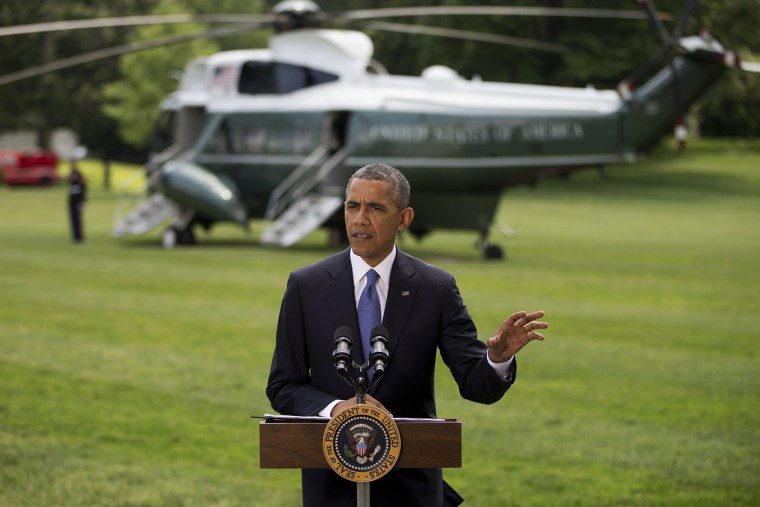Polling on the Affordable Care Act has consistently irked the White House. On the one hand, when independent pollsters ask the public for their opinions on "Obamacare," the law is unpopular and has been for years. On the other hand, when Americans are asked for their opinions about the law's actual provisions, the ACA enjoys broad public support.
Americans aren't quite sure what's in the law, and the result is, they like the ACA less than they think they do.
A similar dynamic is unfolding when it comes to President Obama and
foreign policy.
For much of the Obama administration, the American people viewed foreign policy as one of the president's strengths. Obama ended the unpopular war in Iraq, sought to rebuild strained foreign relations, and authorized the mission that killed Osama bin Laden. Exit polls suggest Obama's foreign policy record helped him defeat Mitt Romney in the 2012 presidential election. But over the past year and a half, the president has been bedraggled by foreign policy controversies.... The negative press has had an effect. Obama's foreign policy approval rating used to run at or ahead of his overall job approval rating, but now the reverse is true. Foreign policy is a weakness for Obama. In addition, his overall job approval has lately shown signs of life; his foreign policy approval hasn't.
If the public was suddenly in a hawkish mood, eager to see U.S. military forces flex their muscles in a series of foreign engagements in multiple theaters, this turn in the president's standing would make perfect sense.
But that's not what's happening. The polls definitely show a downturn in Americans' opinions on Obama's handling of international affairs, but the political dynamic is quite similar to the Affordable Care Act: the public doesn't like the president's approach to foreign policy, but the public approves of what's in the president's foreign policy.
As the crisis in Ukraine intensified in April, for example, polls showed Americans
wanted the United States to impose sanctions on Russia and offer non-military aid to Ukraine. That's exactly what Obama did, which is why it was odd when public support for the president's handling of the crisis
dropped to low levels.
It seems like this comes up all the time. In general, most Americans support multi-party diplomatic talks with Iran. And withdrawal of U.S. troops from Iraq and Afghanistan. And not intervening militarily in Syria's civil war. And getting Sgt. Bowe Bergdahl back. And helping take the lead of international efforts to combat the climate crisis.
It leads to an obvious question with no obvious answer: if the public broadly agrees with the president's foreign policy decisions, why does the public also give the president low marks on his handling of foreign policy?
Reasonable people can come up with competing explanations. Maybe the media in general is too quick to promote whatever John McCain's opinion happens to be on any given day -- even if it contradicts what McCain said before. Perhaps the president's allies haven't invested much effort in presenting a spirited defense to the public. Maybe the public agrees with the White House's individual policies but disapproves overall based on deteriorating conditions in the various hot spots themselves. It's just as likely that much of the public just doesn't know what the president's policies are.
But Kevin Drum recently
flagged a Fareed Zakaria
column that stood out for me.
President Obama has not made a major mistake. He has done a skillful job steering the United States out of the muddy waters he inherited -- Iraq, Afghanistan -- and resisted plunging the country into another major conflict. [...] Obama's strategy of putting pressure on Moscow, using targeted sanctions and rallying support in Europe is the right one -- and might even be showing some signs of paying off. [...] From the Asia pivot to new trade deals to Russian sanctions, Obama has put forward an agenda that is ambitious and important, but he approaches it cautiously, as if his heart is not in it, seemingly pulled along by events rather than shaping them. Once more, with feeling, Mr. President!
Fascinating. The war-time president is making the right calls and showing prudent judgment without making mistakes. But he's not doing it with, you know, pizazz.
Sigh.
Related video:
